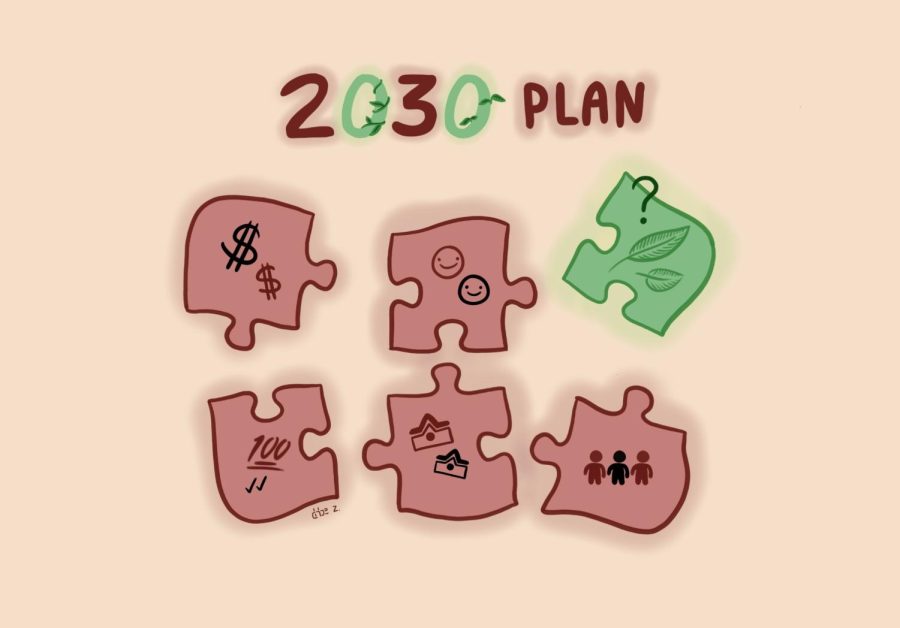Sustainability in the Strategic Framework
Walking out of the CPAC after Mr. Pyne introduced the 2030 Strategic Framework, I felt like something was missing.
At first glance, the renewed commitment to D&I, GRAIN 2.0, counseling, and GEOs all seemed like commendable endeavors. At the same time, though, I was disappointed by the lack of mention of a particular subject: sustainability.
It shouldn’t be news to anyone that we live amidst a climate emergency. The past decade has been the hottest on record, and the UN Intergovernmental Panel on Climate Change estimates that 250,000 lives will be lost every year to climate change from 2030-2050 if current emissions rates continue. Concurrent with the timeline of Groton’s Strategic Framework, 2030 also holds significance on a broader scale: it represents the deadline IPCC identified to curb global warming within 1.5°C. Without an international commitment to halving emissions by this decade’s end, climate change will become irreversible. These effects feel immediately present on the Circle; yet millions worldwide threatened by high tides, standing in the wake of water shortage, and dying prematurely do not have the privilege of debating action as we do now.
Infrastructure-wise, Groton has made efforts to incorporate sustainable practices. Work done during the schoolhouse renovation, the installation of the solar grid, and the construction of the Gardner Village should be commended with pride. But now is not the moment for self-lauding. We are advancing into a decade that could determine the continuity of the earth, and in this delicate race to curb climate change, we need a more explicit institutional commitment to sustainability.
As an educational institution, Groton is deeply obliged to teach sustainability that aligns with the school’s mission to “inspire lives of character, scholarship, leadership, and service.” Crucial to both our ethics and survival, climate change is the most pressing issue of our century. Environmental consciousness is, therefore, an essential component of the school’s mandate for educating responsible citizens. Our peers will become future lawmakers, public servants, constituents, and leaders of their respective professions and communities. To ensure our students gain a fuller awareness of that world and their impact on it, we must incorporate sustainability into Groton’s educational goals.
In addition to a conscious curriculum, Groton’s commitment to sustainability should also involve responsible governance. To be a leader in sustainability requires modeling operational excellence through commitments such as carbon neutrality. I want to belong to a school that cares about my future and demonstrates that care through persistent, visible, large-scale efforts. While the immediate impact of these initiatives may be localized to campus, they are a moral imperative, in addition to informing the culture of our community.
Recognizing the necessity of sustainability, many of our peer institutions in New England have committed to extensive climate action. Northfield Mount Hermon has already achieved net zero in electricity consumption, while Exeter aims to do so by 2030. Out of 11 peer schools with publicly available Strategic Frameworks, Groton is one of only two schools whose plans don’t address sustainability as a strategic priority. With one of the largest student-to-endowment ratios out of all peer schools, Groton has the resources to carry out vast measures to improve sustainability on campus. Yet the inaction of the school signals an institutional complacency that is detrimental to Groton’s ability to prepare future generations for environmental stewardship.
To demonstrate our leadership in responsible, sustainable governance, Groton should amend the 2030 Strategic Framework to include environmentalism as an institutional priority. Many schools, including Andover and St. Mark’s, have also developed detailed Climate Action Plans specialized in sustainability. A plan of this sort would demonstrate Groton’s commitment, define clear goals and evaluation metrics, and provide a source of accountability for the administration. Of course, a plan is only meaningful when brought to fruition, but creating one is a necessary first step. Diversity and inclusion are essential foundations for the present, but sustainability is the key to the future.Sustainability in the Strategic Framework







